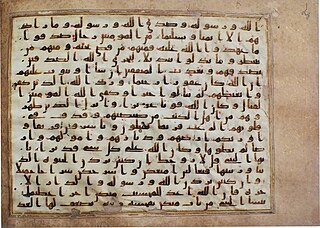Related Research Articles

The Bible is a collection of religious texts or scriptures, some, all, or a variant of which are held to be sacred in Christianity, Judaism, Samaritanism, Islam, the Baha'i Faith, and other Abrahamic religions. The Bible is an anthology originally written in Hebrew, Aramaic, and Koine Greek. These texts include instructions, stories, poetry, and prophecies, among other genres. The collection of materials that are accepted as part of the Bible by a particular religious tradition or community is called a biblical canon. Believers in the Bible generally consider it to be a product of divine inspiration, but the way they understand what that means and interpret the text varies.

In religion, a prophet or prophetess is an individual who is regarded as being in contact with a divine being and is said to speak on behalf of that being, serving as an intermediary with humanity by delivering messages or teachings from the supernatural source to other people. The message that the prophet conveys is called a prophecy.

Philip Schaff was a Swiss-born, German-educated Protestant theologian and ecclesiastical historian, who spent most of his adult life living and teaching in the United States.

Christianity and Islam are the two largest religions in the world, with 2.8 billion and 1.9 billion adherents, respectively. Both religions are considered as Abrahamic, and are monotheistic, originating in the Middle East.

Comparative religion is the branch of the study of religions with the systematic comparison of the doctrines and practices, themes and impacts of the world's religions. In general the comparative study of religion yields a deeper understanding of the fundamental philosophical concerns of religion such as ethics, metaphysics and the nature and forms of salvation. It also considers and compares the origins and similarities shared between the various religions of the world. Studying such material facilitates a broadened and more sophisticated understanding of human beliefs and practices regarding the sacred, numinous, spiritual and divine.

Idolatry is the worship of a cult image or "idol" as though it were a deity. In Abrahamic religions idolatry connotes the worship of something or someone other than the Abrahamic God as if it were God. In these monotheistic religions, idolatry has been considered as the "worship of false gods" and is forbidden by texts such as the Ten Commandments. Other monotheistic religions may apply similar rules.
The religious perspectives on Jesus vary among world religions. Jesus' teachings and the retelling of his life story have significantly influenced the course of human history, and have directly or indirectly affected the lives of billions of people, including non-Christians. He is considered by many to be one of the most influential persons to have ever lived, finding a significant place in numerous cultural contexts.
Christian terrorism, a form of religious terrorism, comprises terrorist acts which are committed by groups or individuals who profess Christian motivations or goals. Christian terrorists justify their violent tactics through their interpretation of the Bible and Christianity, in accordance with their own objectives and worldview.

Bart Denton Ehrman is an American New Testament scholar focusing on textual criticism of the New Testament, the historical Jesus, and the origins and development of early Christianity. He has written and edited 30 books, including three college textbooks. He has also authored six New York Times bestsellers. He is the James A. Gray Distinguished Professor of Religious Studies at the University of North Carolina at Chapel Hill.
Monotheism—the belief that there is only one deity—is the focus of the Abrahamic religions, which like-mindedly conceive God as the all-powerful and all-knowing deity from whom Abraham received a divine revelation, according to their respective narratives. The most prominent Abrahamic religions are Judaism, Christianity, and Islam. They, alongside Samaritanism, Druzism, the Baháʼí Faith, and Rastafari, all share a common core foundation in the form of worshipping Abraham's God, who is identified as Yahweh in Hebrew and called Allah in Arabic. Likewise, the Abrahamic religions share similar features distinguishing them from other categories of religions:

Islam is an Abrahamic monotheistic religion centered on the Quran and the teachings of Muhammad, the religion's founder. Adherents of Islam are called Muslims, who are estimated to number approximately 1.9 billion worldwide and are the world's second-largest religious population after Christians.

The Bridgewater Treatises (1833–36) are a series of eight works that were written by leading scientific figures appointed by the President of the Royal Society in fulfilment of a bequest of £8000, made by Francis Henry Egerton, 8th Earl of Bridgewater, for work on "the Power, Wisdom, and Goodness of God, as manifested in the Creation."
The term Abrahamic religion groups three of the major religions together due to their historical coexistence and competition; it refers to Abraham, a figure mentioned in the Hebrew Bible, the Christian Bible, and the Quran, and is used to show similarities between these religions and put them in contrast to Indian religions, Iranian religions, and the East Asian religions. Furthermore, some religions categorized as "Abrahamic" also share elements from other categories, such as Indian religions, or for example, Islam with Eastern religions.
Rodney William Stark was an American sociologist of religion who was a longtime professor of sociology and of comparative religion at the University of Washington. At the time of his death he was the Distinguished Professor of the Social Sciences at Baylor University, co-director of the university's Institute for Studies of Religion, and founding editor of the Interdisciplinary Journal of Research on Religion.
Bruce D. Chilton is an American scholar of early Christianity and Judaism, and an Episcopalian priest. He is Bernard Iddings Bell Professor of Religion at Bard College, formerly Lillian Claus Professor of New Testament at Yale University, and Rector of the Church of St John the Evangelist He holds a PhD in New Testament from Cambridge University. He has previously held academic positions at the Universities of Cambridge, Sheffield, and Münster.

Religious texts, including scripture, are texts which various religions consider to be of central importance to their religious tradition. They often feature a compilation or discussion of beliefs, ritual practices, moral commandments and laws, ethical conduct, spiritual aspirations, and admonitions for fostering a religious community.
Christopher Charles Rowland is an English Anglican priest and theologian. He was Dean Ireland's Professor of the Exegesis of Holy Scripture at the University of Oxford from 1991 to 2014.

George Aaron Barton was a Canadian author, Episcopal clergyman, and professor of Semitic languages and the history of religion.

Sidney H. Griffith is a professor of Early Christian Studies at the Catholic University of America. His main areas of interest are Arabic Christianity, Syriac monasticism, medieval Christian-Muslim encounters and ecumenical and interfaith dialogue.
World Christianity or global Christianity has been defined both as a term that attempts to convey the global nature of the Christian religion and an academic field of study that encompasses analysis of the histories, practices, and discourses of Christianity as a world religion and its various forms as they are found on the six continents. However, the term often focuses on "non-Western Christianity" which "comprises instances of Christian faith in 'the global South', in Asia, Africa, and Latin America." It also includes Indigenous or diasporic forms of Christianity in the Caribbean, South America, Western Europe, and North America.
References
- ↑ Date information sourced from Library of Congress Authorities data, via corresponding WorldCat Identities linked authority file (LAF) . Retrieved on May 22, 2008.
- ↑ "Distinguished Professor of History". Faculty: Philip Jenkins. Baylor University. June 6, 2022.
- ↑ "Curriculum Vitae". Department of History & Religious Studies Program, Penn State University (PSU). Archived from the original on March 17, 2008. Retrieved May 22, 2008.
- ↑ PSU resume
- ↑ 'Appendix V. Candidates who Took the Anglo-Saxon, Norse and Celtic Tripos between 1900 and 1999', in H. M. Chadwick and the Study of Anglo-Saxon, Norse and Celtic in Cambridge, ed. by Michael Lapidge [=Cambrian Medieval Celtic Studies, 69–70] (Aberystwyth: Department of Welsh, Abersytwyth University, 2015), pp. 257–66 (p. 262).
- ↑ Cowell, Penelope (1992). Mastermind Winners . pp. 40–43. ISBN 978-0-563-36317-0.
- ↑ "Philip Jenkins — History and Religious Studies". Department Faculty. Pennsylvania State University. Archived from the original on March 17, 2008.
- ↑ Al Jazeera, March 26, 2010
- ↑ Jenkins, Philip (2003), "Preface", The New Anti-Catholicism: The Last Acceptable Prejudice (Look Inside), Amazon, p. vii.
- ↑ Jenkins, P (March 3, 2002). "Forum: The myth of the 'pedophile priest'". Pittsburgh Post-Gazette . Retrieved May 16, 2010.
- ↑ Hagerty, BB (March 18, 2010). "Is The Bible More Violent than The Quran?". National Public Radio . Retrieved May 16, 2010.